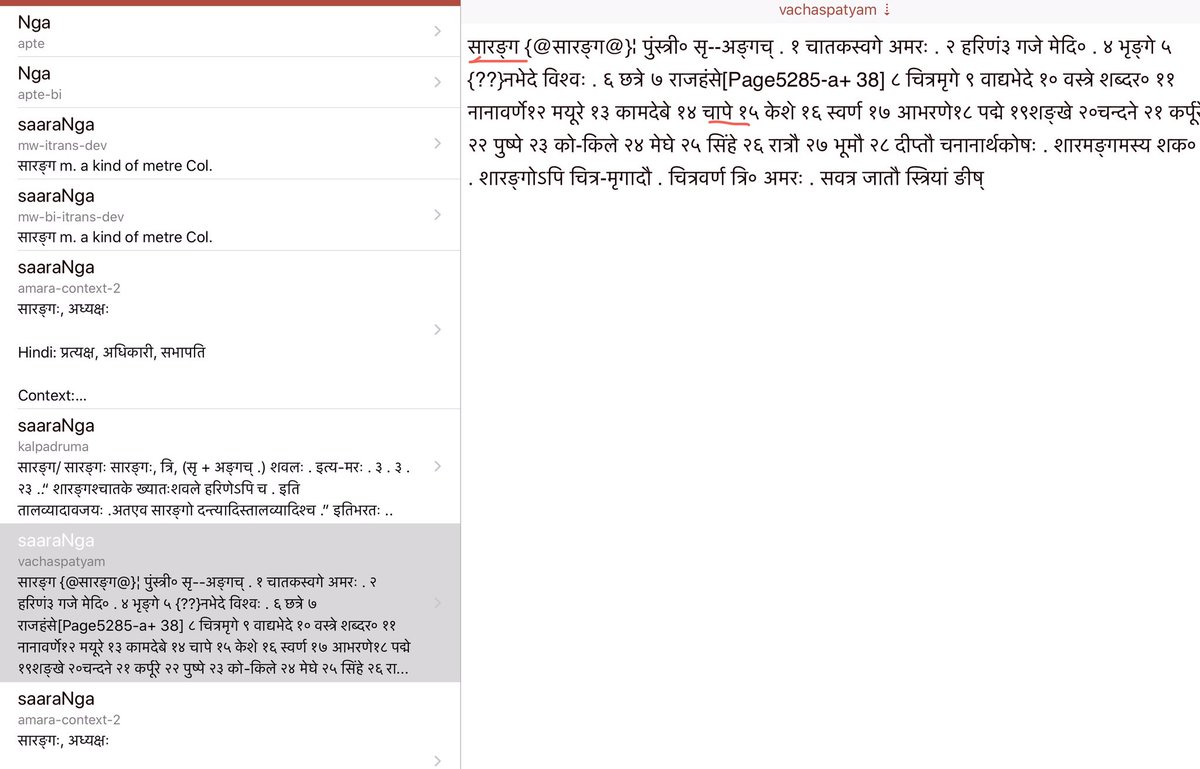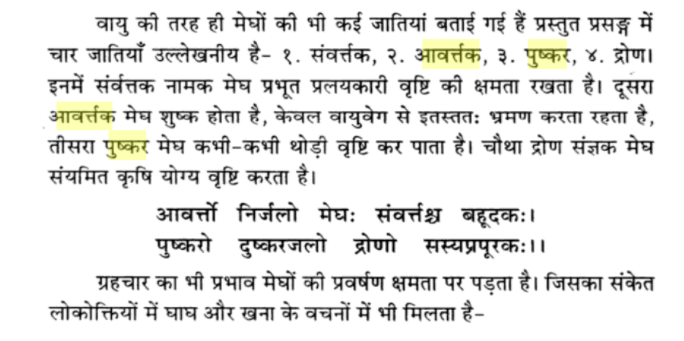The arrival of rains in my town has prompted me to present certain observations regarding Rāga Megh. I have arrived at these observations through my analysis of music theory and Sanskrit language and literature. I will present my analysis as a thread. (1/n)
#Raga #Rain #Music
#Raga #Rain #Music
Megh is an ancient Rāga, appearing sixth in the Rāgamālā system. However, it does not imply a rāgāṃga. The rāgāṃga characteristic of Megh is Sāraṃga . Interestingly, Sāraṃga itself does not find a place in the Rāgamālā system. (2/n)
#Raga #Rain #Music
#Raga #Rain #Music
Today, we simply know Sāraṃga as a rāgāṃga. No mention of Sāraṃga is complete without an epithet, such as śuddha or vṛndāvanī.
However, one of the meanings of Sāraṃga is Megh (cloud). Thanks to @pvaal2, see the citation from वाचस्पत्यम् attached. (3/n).
#Raga #Rain #Music
However, one of the meanings of Sāraṃga is Megh (cloud). Thanks to @pvaal2, see the citation from वाचस्पत्यम् attached. (3/n).
#Raga #Rain #Music
It is therefore possible that Sāraṃga is just the name given to the rāgāṃga of Megh. This rāgāṃga permeates the Malhāra and Kānharā families, and even touched Rāga Vāgīśvarī (of kāfī ṭhāṭa), treated by medieval singers as a type of Kānharā. (4/n)
#Raga #Rain #Music
#Raga #Rain #Music
Among the numerous Rāgas of the Sāraṃga family, Madhamāda (or Madhyamādi) Sāraṃga is congruent in scale to Megh. The difference only emerges from its treatment. Madhamāda Sāraṃga is an ancient Rāga and is known as Madhyamāvatī in Carnatic music. (5/n)
#Raga #Rain #Music
#Raga #Rain #Music
Madhamāda has ceded its space as the dominant Rāga of the Sāraṃga family to Vṛndāvanī Sāraṃga after much debate. Part of the argument rested on its similarity to Megh, which commands its own vast repertoire. (6/n)
#Raga #Rain #Music
#Raga #Rain #Music
And then there is the Malhāra family. It is surprisingly not listed in the Rāgamālā scheme but appears in many forms developed by musicians: Surdas (Sūradāsī), Ramdas (Rāmadāsī), and Tansen (Miyām̐ kī Malhāra—the same as the ancient Gayand Malhāra). (7/n)
#Raga #Rain #Music
#Raga #Rain #Music
Megh also combines with Malhāra to form Megh Malhāra. Moreover, the Dhrupad gharana of Darbhanga divides Malhāra into two further categories: śveta (pre-rain white clouds) and śyāma (rain-bearing dark monsoon clouds). (8/n)
#Raga #Rain #Music
#Raga #Rain #Music
How can we systematize this diversity of Rāgas that appear as Megh, Sāraṃga or Malhāra? I will now propose a system based on the Purāṇās and kāvyas. I first thought of this when I read the following line in Kalidasa& #39;s Meghadūtaṃ:
"जातं वंशे भुवनविदिते पुष्करावर्तकानां" (9/n)
"जातं वंशे भुवनविदिते पुष्करावर्तकानां" (9/n)
In Sanskrit literature, four types of Meghas (clouds) are mentioned:
1) आवर्तक: Rain-less clouds
2) संवर्तक: Clouds bringing deluge (even प्रलय)
3) पुष्कर: Clouds bringing some rain
4) द्रोण: Clouds bringing appropriate amount of rain for crops
(10/n)
#Raga #Rain #Music
1) आवर्तक: Rain-less clouds
2) संवर्तक: Clouds bringing deluge (even प्रलय)
3) पुष्कर: Clouds bringing some rain
4) द्रोण: Clouds bringing appropriate amount of rain for crops
(10/n)
#Raga #Rain #Music
Now, let us use these 4 categories to classify Rāgas Megh, Sāraṃga and Malhāra:
आवर्तक: These Rāgas are close to Megh but more suited for the pre-rainy season. I place the Sāraṃga family Rāgas (except Madhyamādi) here because they are best sung on summer afternoons.
(11/n)
आवर्तक: These Rāgas are close to Megh but more suited for the pre-rainy season. I place the Sāraṃga family Rāgas (except Madhyamādi) here because they are best sung on summer afternoons.
(11/n)
संवर्तक: These Rāgas represent the clouds of deluge and are infused with vīra rasa. The Puranas even call these clouds आग्नेय (fiery), as seen in the commentary to the Meghadūtaṃ. Here, we can place Rāgas Megh and Madhyamādi Sāraṃga.
(12/n).
#Ragas #Rain #Music
(12/n).
#Ragas #Rain #Music
Why should Madhyamādi Sāraṃga be classified as संवर्तक?
The word मध्यमादिः is derived as मध्यमः आदिः यस्य सः, i.e., one that begins with Madhyama swara. This Madhyama "flickers" throughout the Rāga, almost like a flame, evoking the आग्नेय (fiery) quality of this Rāga.
(13/n)
The word मध्यमादिः is derived as मध्यमः आदिः यस्य सः, i.e., one that begins with Madhyama swara. This Madhyama "flickers" throughout the Rāga, almost like a flame, evoking the आग्नेय (fiery) quality of this Rāga.
(13/n)
पुष्कर: These clouds may bring some rain (जलवर्षा) but they mostly bring wind (वायुवर्षा) and hail (उपलवर्षा). Hence, I have placed the rare Rāga śveta malhāra in this intermediate category of Rāgas, meant to be sung at the beginning of the rainy season.
(14/n)
#Raga #Rain
(14/n)
#Raga #Rain
द्रोण: Finally, we behold the clouds that are best suited for our livelihoods. We pray for and celebrate their arrival by singing all other Rāgas of the larger Malhāra family.
Thus, we have applied a śāstra-based classification to a large number of adjacent Rāgas.
(n/n)
Thus, we have applied a śāstra-based classification to a large number of adjacent Rāgas.
(n/n)

 Read on Twitter
Read on Twitter




